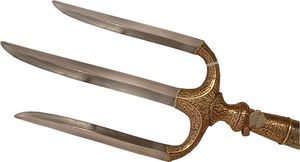Trident
| ) | |
|---|---|
| Name | trident |
| Appearance | trident |
| Damage vs. small | 1d6+1 |
| Damage vs. large | 3d4 |
| To-hit bonus | +0 |
| Weapon skill | trident |
| Size | one-handed |
| Base price | 5 zm (+10/positive enchant) |
| Weight | 25 |
| Material | iron |
A trident is a kind of weapon. It has a special +4 to-hit bonus against swimming monsters that are in water. If the monster is not in water, there is still a +2 to-hit bonus if it belongs to the snake or sea monster class.[1]
Tridents are significant as a popular choice for the secondary weapon in twoweaponing.
Contents
Trident skill
| Trident | |
|---|---|
| Max | Role |
| Basic | |
| Skilled | |
The trident is the only weapon to use the trident skill. There are no artifact tridents.
Generation
Tridents are one of the rarer weapons in the game, making up only about 0.8% of all randomly generated weapons, so it is difficult to get one before the midgame, giving you little time to train the skill. In addition to normal random generation methods, such as death drops and shops, the following monsters have a unique chance of being spawned with a trident in their monster starting inventory:
- Salamander. 2 in 21, or about 9.52%.[2]
- Sadly, they are also very rare to even spawn, making this largely ineffective for obtaining a trident. While they appear in large numbers on the Plane of Fire, by that time a player has already completed their ascension kit and likely ignoring all drops.
- Horned devil. 3 in 4, or exactly 75%.[3]
- If looking for a trident, it may be beneficial to avoid killing horned devils that do not have tridents in Gehennom to encourage the odds of another spawning with a trident. The player need only kill ~2.16 to be 95% certain to obtain one, and ~3.32 to be 99% certain. If you are polymorphed into a horned devil, there is a 1 in 13 chance of summoning a tame demon every time you hit a monster with your bare or gloved hands. ~50.41 strikes is enough to be 95% certain of creating another demon, and ~77.5 for 99% certainty. A bullwhip can be used to disarm a pet horned devil of its trident; otherwise, you will have to have some means of killing the resulting tame devil(s), such as conflict.
Messages
- That was pure chewing satisfaction!
- YAFM for eating a trident while polymorphed into a metallivore. (Advertising slogan for Trident sugar free chewing gum.) This exercises wisdom.[4]
- Four out of five dentists agree.
- Alternate message if hallucinating.
Strategy
The trident averages 7.5 damage versus large monsters, one point more than a katana, making it the most damaging one-handed non-artifact weapon versus large monsters. Along with the silver saber, crysknife and katana, the trident is one of the best choices for twoweaponing.
Average damage calculation
The average damage calculations in the following table do not include bonuses from weapon skills, strength, or from using a blessed weapon against undead or demons.
| Weapon | Small monsters | Large monsters |
|---|---|---|
| +0 trident | 
|

|
| +7 trident | 
|

|
Origin
Tridents and military forks were seen in real-life warfare, with the trident's tines often affixed with barbs to assist it in its primary peacetime use: fishing. In NetHack, this is referenced with the fact that it has a bonus when facing water creatures (though this point is mostly academic, as coming into melee range with a water creature is generally a bad idea).
In warfare, tridents were favored for their long reach and ability to disarm and dismount a horse-riding combatant. In the world of NetHack, tridents have no particular benefit against the Riders, nor is it possible to disarm an opponent with them. Oddly, it is possible to disarm them with a battle-axe or other two-handed weapon, by sundering the monster's weapon, or with a bullwhip. Military forks, in the real world, furthermore had abilities as a tool, such as raising siege ladders, and would work in a pinch for most things a pitchfork would; they enjoy no special benefits as a tool in NetHack.
The fact that it deals much more damage than the spear, or the literally named "forked polearm" (spetum), is rather curious, historically speaking. A trident's three tines may have inspired the DevTeam to give them 3d4 damage, as though striking with three daggers at once; this is largely incorrect. The fact that it does not use the polearm skill, and moreover, that the description "forked polearm" doesn't belong to it, as it would far more accurately describe a military fork, is similarly quite curious.
Tridents exist in canonical D&D, where they dealt 1d8 base damage versus opponents, but have a lower critical hit multiplier, meaning it was, in fact, worse than the similar 1d8 long spear, insofar as raw damage. As in NetHack, however, they were a one-handed weapon; this meant that a trident user could still have the added benefit of a shield, or the versatility of an off-hand weapon. The trident's 1d8, for a one-handed weapon, was still better than the 1d6 of the one-handed short spear.
History
The trident was present in the first public release of Hack, Hack 1.0.3.
References
This page may need to be updated for the current version of NetHack.
It may contain text specific to NetHack 3.6.0. Information on this page may be out of date.
Editors: After reviewing this page and making necessary edits, please change the {{nethack-360}} tag to the current version's tag or {{noversion}} as appropriate.

